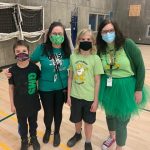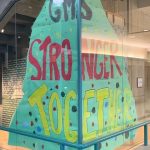Transformative Educational Leadership Journal | ISSUE: Spring 2022
A leader’s approach to noticing, encouraging, and celebrating others can influence communities. In this reflective narrative, Jesse Bruce shares one school’s pandemic leadership experience and how a relational approach to caring for and interacting with school staff influenced the culture of a school and community.
By Jesse Bruce
Ours is a story of opportunity born amidst the backdrop of a global pandemic. A leadership adventure mired in mystery and wrought with new beginnings, surprising twists and turns, and ‘never endings.’ In our story, you will, no doubt, notice threads of your own. With First Peoples Principles of Learning weaving our reflective tapestries together, let’s pause, reflect, and do some learning together.
Learning is relational; focused on connectedness and reciprocal relationships. Learning involves the exploration of one’s identity. Learning involves the well-being of self and the community. Learning is embedded in memory, history, and story (FNESC, 2007).
Throughout this pandemic, we have become acutely aware of our role in influencing school and community culture. How we treat others matters. How we interact matters. How we notice, encourage, and celebrate each other matters and impacts our community. Our relational approach to caring for the adults and interacting with our students matters.
Through reflective inquiry, a central focus of our pandemic leadership became grounded in modeling care for staff and families so they, in turn, could care for students.
At a time when anxiety, stress, and fear clouded our collective purpose, what were we, the not so fearless leadership team, doing to promote a culture of care in our learning community?
We already knew that learning is enhanced in the presence of connectedness and belonging. If I’m safe and cared for, I can learn. If I am seen, heard, and valued, I am more likely to engage and contribute.
Scanning school data nudged us to ask deeper questions:
- How were we already caring for our community? Was everyone okay?
- How do we know? What could we do to check?
- How are we contributing to the health and wellness of our learners?
- Were we making enough of a difference?
- Was pandemic stress contributing to decreased connectedness?
- Was it the absence of school events, assemblies, and social agency?
- Where was the joy?
- What could we control?
Scanning resulted in new learning and reinforced:
- the idea that connecting to positive, caring people promotes feelings of self-worth, security, and hope.
- the understanding of a sense of belonging as a basic human need considered by some to be a human right.
- that finding that feelings of belonging require psychological safety and can only be present within positive relationships.
“If I’m safe and cared for, I can learn. If I am seen, heard, and valued, I am more likely to engage and contribute.”
Bolstered by collaboratively cultivated team belief statements specific to our goal, we inquired further. What are we doing that we should be doing more of? What do we need to reconsider?
Exploring these tangles through an appreciative lens and giving time for safe and productive dialogue further narrowed our focus and insighted a moment of clarity: modeling care for the adults in our community, with a keen awareness of our regard for others, will positively affect their approach with students and subsequently support the health and well-being of youth in our schools. A critical piece of our leadership focus became intentionally caring for adults.
A critical piece of our leadership focus became intentionally caring for adults.
Simply speaking, we narrowed our leadership focus to what Nel Noddings (2005) describes as a culture of care: “Caring starts not with the relation but with caring as a virtue belonging to carers.” The phrase, ‘a virtue belonging to the carers,’ poignantly communicates the responsibility incumbent on leaders to wholeheartedly and fearlessly care. Be the first to care. Model care. In turbulent times and difficult moments, care. We impact our community by caring for the adults and holding an expectation that they, in turn, care for students. That they are the first to care. That they model care.
Noddings (2005) teaches about the elemental nature of caring in education. Her research is reinforced by Jennifer Katz who shares that “in care ethics, relation is the core principle of education, and the caring relation is ethically basic to teachers (educators)” (2018). The opposite of feeling cared for is feeling rejected, alienated, and unwelcome … and results in varying degrees of student estrangement from the learning process.” School leaders never want staff or students to feel rejected, alienated, or unwelcome. Determined to grow a culture grounded in connection, belonging and contribution, our school-based leadership team, including remarkably committed teachers and support staff, used the results of our school scan to focus on what would have the biggest impact.
We named our intention, ‘to grow a caring school culture;’ we landed on our theme, Stronger Together; and we gave language to a new school goal aimed at connection, belonging, and contribution. What came next was remarkable. Visible signage and consistent messaging gave clarity and purpose to our mission. Announcements and learning, spirit days and special events, assemblies and enrichment activities – our very culture – became about caring for each other and celebrating that our diversity makes us stronger. Students and staff were building connections, engaging in joyful learning, and contributing to a culture of belonging intentionally designed to support well-being.
Students and staff were building connections, engaging in joyful learning, and contributing to a culture of belonging intentionally designed to support well-being.
There is a lot to notice and celebrate in connection to our ‘Stronger Together: Connect, Belong, Contribute’ mantra. However, what lies more subtly beneath buoys us up.
We believe that our strength is in our diversity. We believe our stories shape us; that it is the journey of becoming that alerts us to the unique attributes we carry with us and influences what we offer the community. Sharing our stories, celebrating our diversity, and naming what we offer as adults inspires us to do the same for students. Reflecting on, acknowledging and sharing our stories makes space for the stories of our students. We then celebrate their diversity and give value to what they offer our community. To truly care for them.
En-ow-kin-wix is based on the idea that everyone in the community has different viewpoints, ideas, concerns, knowledge, and passions. This approach considers these differences to be strengths of community because every person has a small piece of the answer inside them to offer (Cohen, 2016).
In response to the teaching of Bill Cohen, our school-based leadership team anchored adult learning meetings, both formally and informally, in story. Each time we gather, space and time is given to sharing in memory, history, and stories of becoming. By invitation, staff launch our learning together by sharing their journey to this place, our school, and community. Stories are made visible with artifacts that stand as metaphor for their journey and the subsequent attributes they offer the community. Together, we strive to understand and honour one another.
Our understanding of the world – thus of others’ stories – is necessarily rooted in our own experiences as well as in the various categories of identity that we inhabit, we cannot approach others’ stories before becoming aware of our own” (Lewis and Hildebrandt, 2019).
With the understanding that “innovation floats on a sea of inquiry” (Kaser & Halbert, 2017), we continued to spiral through inquiry:
- Has our approach with staff influenced student well-being?
- How do we know?
Re-calibrating our focus, naming our values, and moving forward with intention began with a school community scan specific to student needs in the context of the pandemic. The unexpected learning for our leadership team moved us to be more attentive to the adults in our community; to lead the adults with increased regard for their social-emotional well-being. We sought to provoke connectedness, ensure belonging, and empower contribution amongst the adults in hopes they would do the same for students. And, of course, the incredible group of professionals at École Glenrosa Middle School refined their approach and redoubled their commitment to care for students during an extraordinary and traumatic time in their lives. Their approach truly placed students at the centre, accounting for individual differences and in recognition that emotions are integral to their learning (OECD Principles of Learning, 2010).
We sought to provoke connectedness, ensure belonging, and empower contribution amongst the adults in hopes they would do the same for students.
Ever improving in this endeavor, we know we are making a difference.
Transformational leaders ask why, what if, and how? These questions are part of our journey. In sharing this chapter of our leadership story, we invite you to reflect on your own and encourage you to share it with your colleagues. Your stories matter. There is value and learning in sharing them.
References
- Cohen, B. (2016). Stories of Our Syilx Ways. Okanagan Indian Band.
- Cooperrider, D., & Whitney. D. (2005). Appreciative Inquiry: A Positive Revolution in Change. Berrett-Koehler Publishers, Inc.
- First Nations Education Steering Committee. (2007). First Peoples Principles of Learning.
- Kaser, L., & Halbert, J. (2017). The Spiral Playbook: Leading with an inquiring mindset in school systems and schools. C21 Canada.
- Katz, J. (2018). Ensouling Our Schools: A Universally Designed Framework for Mental Health, Well-Being, and Reconciliation. Portage & Main Press.
- Lewis, P.J., & Hildebrandt, K. (2019). Storytelling as Qualitative Research. Sage Research Methods Foundations.
- Noddings, N. (2005). The Challenge to Care in Schools. Teachers College Press.
- OECD Centre for Educational Research and Innovation. (2010). The Nature of Learning: Using Research to Inspire Practice. OECD Publications.






Fantastic article Jesse – and true! You and the team of educators and support staff at Glenrosa Middle School are truly creating a culture of caring!
A crisis is a catalyst for change … and opportunity! Your school’s focus on caring through appreciation is a perfect antidote to counteract a prevailing pandemic. Thank you for sharing such an uplifting school leadership story … beautifully & brilliantly written.